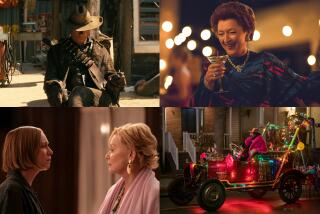Vintage Steele
- Share via
I was sitting in my office when the call came from Fox TV. The studio was releasing a DVD collection of the first season of “Remington Steele.” Was I willing to be interviewed for a special feature about my experiences writing for the show, and an episode of mine they wanted to highlight?
Remington Steele. It was a name out of my past. I searched through my office for tapes of the show, pulling each one out like old evening wear stored in the back of my closet. That night I watched them, not knowing what to expect after all these years. Like a classic little black dress, each episode held up. It was clever. It had charm. It was funny.
“Remington Steele” was the first television series for which I wrote, a first job for many of its writers. Most of us were young. Single. Just married. Or having flings. And the irreverent tone of the show fit us like a snug pair of jeans.
The writing staff worked out stories together, throwing ideas around in a good-natured free-for-all, filled with inevitable one-upmanship. The beginning shows centered around Remington. Who was he? What was his past? The only woman, I presented the revolutionary notion of writing about the brains behind the operation, Laura Holt. There had to be more to Laura than the buttoned-up professional we saw on the screen. What about lovers? What if an old flame turned up? My husband had just returned from a business trip to Rancho Cucamonga, a name intrinsically funny to me. There were wineries there. What if we set the story in a winery? What if? What if? My episode, “Vintage Steele,” was born.
Feeding the maw of a weekly television series means writing quickly. Long nights. I wrote my script. Did rewrites. On the first day of shooting, I drove out to the location--a winery, yes, in Rancho Cucamonga. There were the actors. Director. Camera and cables. All this hullabaloo.
Unlike my own kids, I didn’t grow up in a media-saturated culture, where cashiers, as well as studio heads, can recite weekend box-office receipts. You turned on the TV and images appeared on the screen, like magic. You never wondered how. Now there was magic of another kind, seeing a world made real because of the words I’d written.
I did other episodes for “Remington Steele,” went on to different shows, wrote films for television and features. “Remington Steele” went off the air.
Just the other night, I watched the DVD, special features and all, for the first time. As I listened and watched, I realized that in the paradoxical way our culture discards its products ever faster, only to reclaim them in order to savor--and profit from--the past, “Remington Steele” had become something timeless. Like memory.
At the end of the first season, the executive producer told me that “Vintage Steele” was being submitted for an Emmy that year. It didn’t win. It didn’t get a nomination. But promise beckoned in that first blush of working life, the heady bouquet of the future rose.
And I understood, whether on the glittering road to the Emmys, or in the satisfaction of filling the first blank page of a script, a single truth moves the laughter and tears called forth from the audiences that Norma Desmond so poignantly calls “those wonderful people out there in the dark”: In the beginning, there is the word.
More to Read
The complete guide to home viewing
Get Screen Gab for everything about the TV shows and streaming movies everyone’s talking about.
You may occasionally receive promotional content from the Los Angeles Times.






